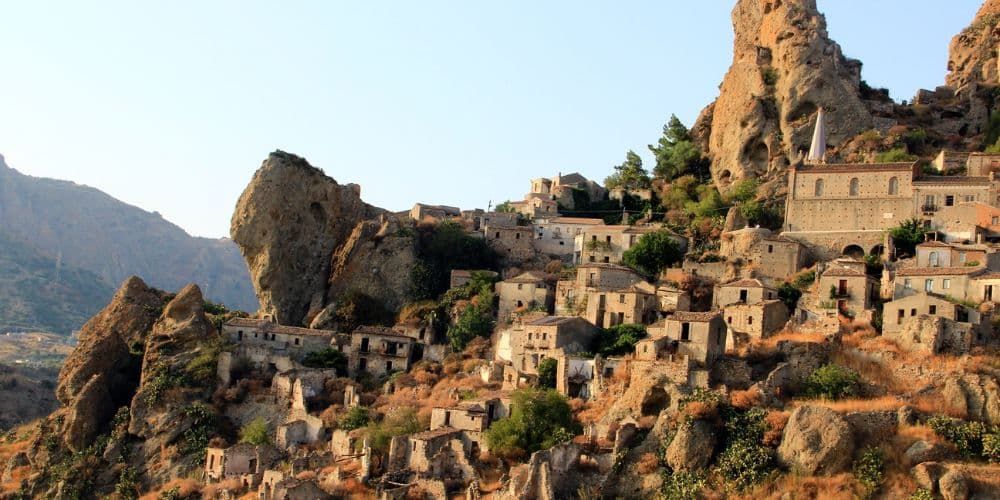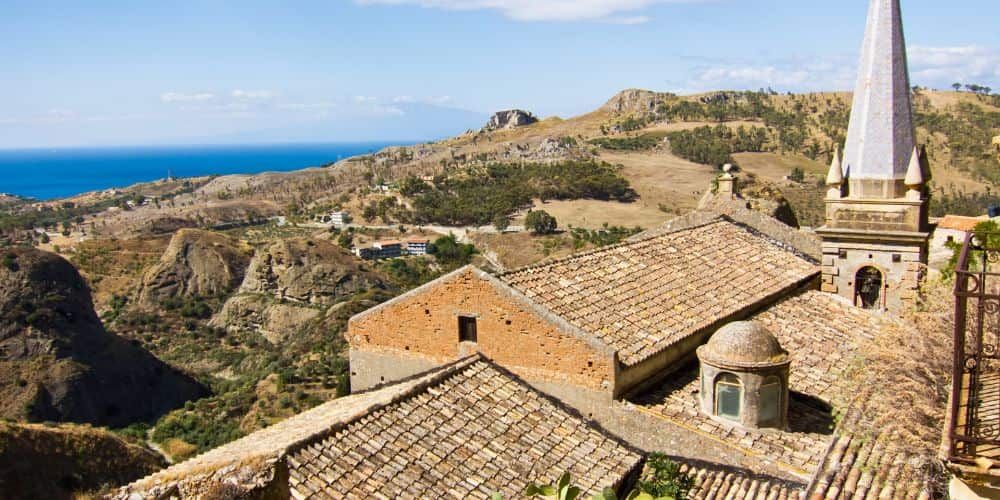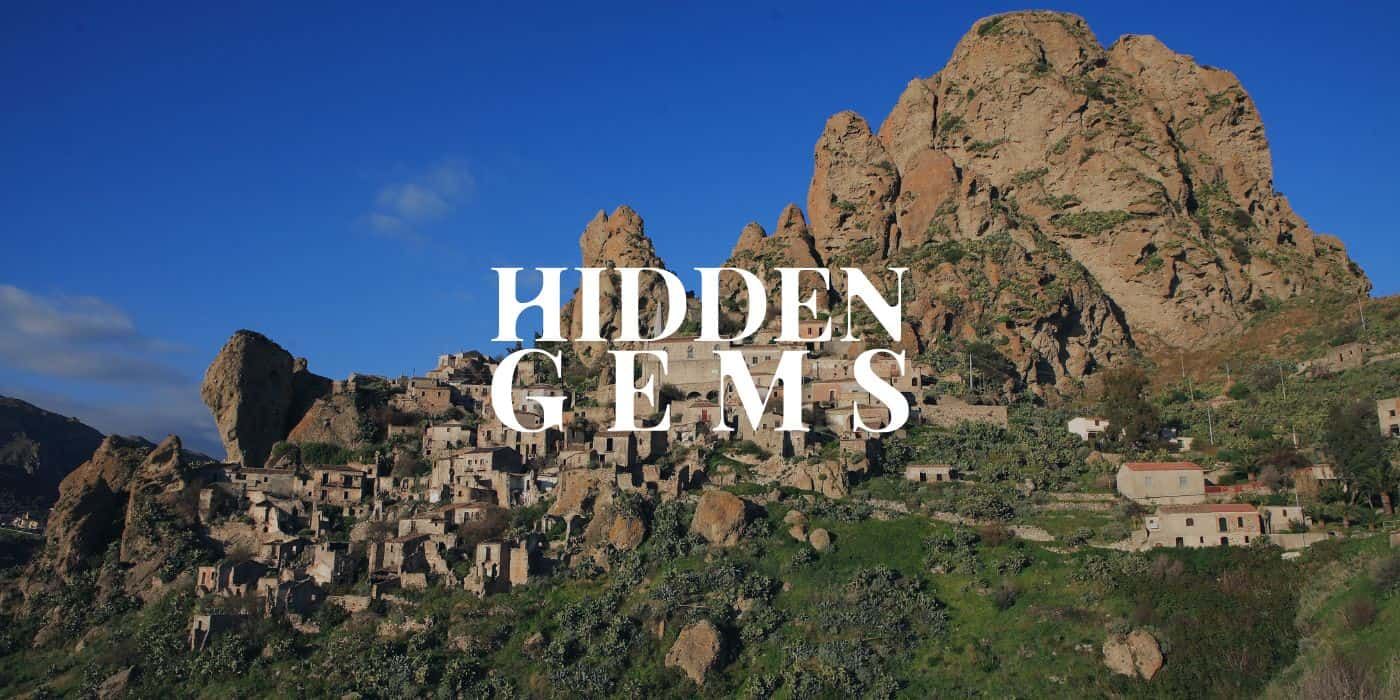Pentedattilo is a small village located in the Municipality of Melito Porto Salvo, in the Province of Reggio Calabria. It's located on the cliff of Monte Calvario, 250 meters above sea level.
The mountain has a characteristic shape that remember a cyclopean five-fingered hand from which derives the name of the village in the Greek language πέντα-δάκτυλος (transliterated pènta-daktylos), or "five fingers".
Just below the mountain, first it was built the castle, of which today it's possibile just admire some ruins, and then all around the old town.
Due to natural threats, in particular earthquakes and floods, in 1968 Pentedattilo was declared uninhabitable and after three years it was definitively abandoned.
Only in the Eighties, some young people and associations from all over the world recognized its value and began a long process of redevelopment.
So, let's discover what to see in Pentedattilo!

What to do in Pentedattilo

Thanks to the work of people, the village of Pentedattilo today can shine again.
Surrounded by the landscapes of Aspromonte, the scenery is truly breathtaking. Almond trees, broom and bergamot plants are the fragrant backdrop to any visit to the "5-fingered village."
Among the must-see attractions is definitely the Church of Candelora, which houses a 16th-century sculpture representing the Madonna and Child.
What makes a visit to Pentedattilo unique, however, is the opportunity to stroll among the old stone cottages surrounded by prickly pears, where local artisans and artists have opened a number of workshops to sell their glass, wood and ceramic artifacts.
Also not to be missed are visits to the Museum of Peasant Folk Traditions (MuTrap), which houses inside it typical objects and materials from the peasant tradition, and the House of Bergamot, which preserves some ancient tools used to extract the prized essence of bergamot, the typical citrus fruit of the province of Reggio Calabria, and sells natural products made from it and its derivatives.
Pentedattilo also hosts two important festivals during the summer period:
- Paleariza, a traveling festival that tends to enhance the tradition of Grecanico, a particular language still spoken in the area.
It touches 14 historic towns and villages in Greek Calabria through Greek language courses, theater performances, workshops, exhibitions and trekking routes to raise awareness of the area's inland areas.
- The Pentedattilo Film Festival, an international festival dedicated to emerging short film directors.
The overwhelming history of Pentedattilo

Calcidese colony in 640 BC, Pentedattilo was a prosperous economic center and an important military center during the Greek-Roman period due to its strategic position of control over the Sant'Elia river, a privileged way to reach Aspromonte.
With the Byzantine domination began a long period of decline, due to the constant lootings by the Saracens and later by the Duke of Calabria.
In the twelfth century Pentedattilo was conquered by Normans and from that moment it was ruled by several noble families, but two families in particular, that ones of the Alberti and Abenavoli, marked the history of this place, because of a tragic event known as the Massacre of the Alberti.
In 1783 Pentedattilo was seriously damaged by a devastating earthquake, and following it a constant flow of migrations began towards Melito Porto Salvo which persisted until the Risorgimento period. Precisely because of the depopulation in 1811 the municipality was transferred to Melito Porto Salvo and Pentedattillo became a fraction.
The Alberti massacre and the legend of the Devil's Hand
The history of Pentedattilo is marked by a tragic event known as the Massacre of the Alberti, which took place in 1686.
Protagonists of the story were the members of two noble families: the Alberti, marquises of Pentedattilo, and the Abenavoli, former feudal lords of the village.
There had always been a heated rivalry between the two families, which however seemed to wane following the proposal by Baron Bernardino Abenavoli to marry Antonietta, daughter of the Marquis Alberti.
Lorenzo Alberti, however, decided to give his sister's hand to the son of the Viceroy of Naples, Don Petrillo Cortez. Baron Bernardino was furious about it and decided to take revenge. On the night of April 16, 1686, he entered in the castle of Pentedattilo with a group of armed men and killed everyone (even Simone Alberti, Lorenzo's 9-year-old brother!) with the exception of his beloved and groom, taken in guarantee for any retaliation by the Viceroy.
The Viceroy sent a real military expedition, capturing the perpetrators of the massacre, whose heads were cut and hung on the battlements of the Pentedattilo Castle. But Bernardino managed to escape, forcing Antonietta to marry him, and then abandoned her in a convent, where she finished her days consumed by pain. Bernardino enlisted in the Austrian army where he found death killed by a cannonball.
The history of the Alberti massacre over the centuries has given rise to various legends.
One of them says that one day the huge hand will hit men to punish them for their blood thirst. Another says that the stone towers overlooking the town represent the bloody fingers of the hand of Baron Abenavoli (for this reason Pentedattilo has been repeatedly referred to as "the hand of the Devil").
Finally, on nights of strong wind, among the throats of the hand of the Devil, it seems that the screams of pain of the Alberti can still be heard.
How to get to Pentedattilo
Pentedattilo, Reggio Calabria, Italy
Pentedattilo is located about 30 km south of Reggio Calabria. To reach this village by car, you need to drive along the SS 106 Jonica towards Melito Porto Salvo.
However, if you want to reach the village on foot, why not be tempted by a trek of about 2 hours from Melito to Pentedattilo? The views along the way are nothing short of incredible.
About the author
Written on 28/02/2024



Antonella Di Mauro
Discover the enchanting ghost town of Pentedattilo in Southern Italy: all the things to do and visit in this amazing place.